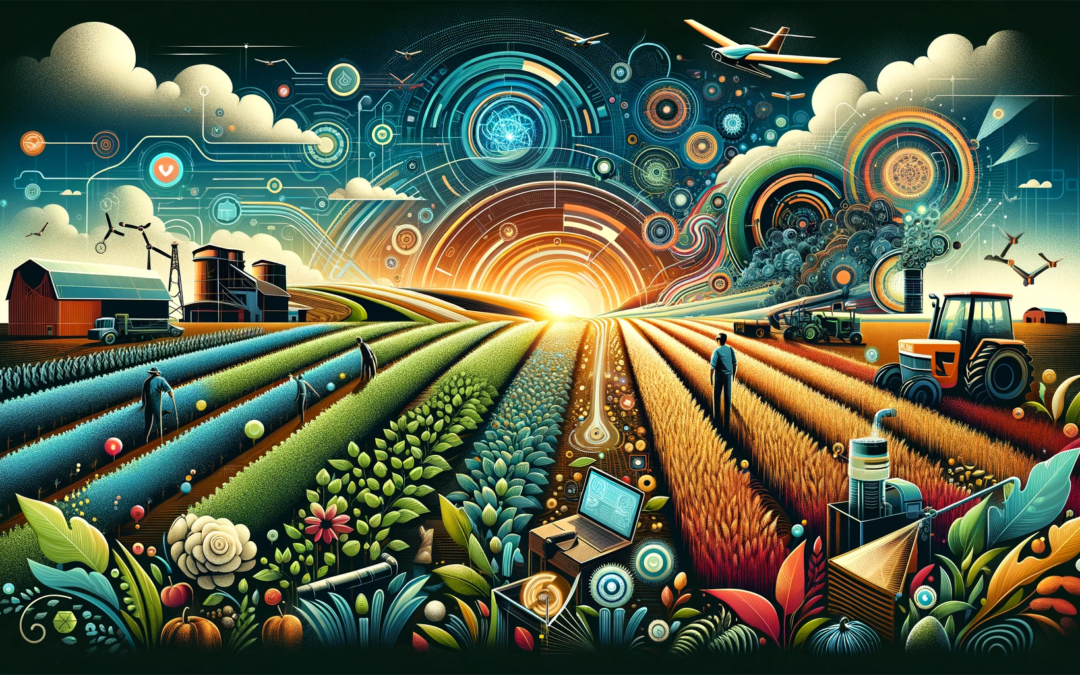In today’s rapidly changing world, the agricultural sector faces numerous challenges, from resource management to environmental sustainability. However, with the advent of AI, a revolutionary tool has emerged that has the potential to transform precision agriculture and address these challenges. In this blog post, we will explore the role of AI in advancing sustainable farming practices and revolutionizing the way we grow our food.
AI in Crop Monitoring and Management
One of the key areas where AI is making a significant impact is in crop monitoring and management. Through real-time monitoring of crop health, soil conditions, and environmental factors, AI technologies provide farmers with invaluable insights. Drones equipped with AI algorithms can capture high-resolution images of crops, detecting signs of disease or nutrient deficiencies that may be invisible to the naked eye. Sensor networks, powered by AI, can collect data on temperature, humidity, and soil moisture, enabling farmers to make data-driven decisions about irrigation and resource allocation.
AI in Predictive Analysis and Yield Optimization
AI’s ability to analyze vast amounts of data is revolutionizing predictive analysis in agriculture. By crunching numbers and identifying patterns, AI algorithms can predict crop outcomes, optimize planting strategies, and enhance yield efficiency. This not only helps farmers maximize their productivity but also reduces waste and conserves resources. In fact, there have been cases where AI-driven predictive analysis has resulted in significant improvements in agricultural productivity, leading to higher crop yields and increased profitability.
Sustainable Farming Practices with AI
As the world grapples with the need for more sustainable agricultural practices, AI is playing a crucial role in driving change. AI tools assist in implementing sustainable farming practices, from water conservation to reducing the use of chemicals. By analyzing data on weather patterns, soil conditions, and crop requirements, AI algorithms can optimize irrigation schedules, minimizing water waste. AI can also help farmers reduce the use of pesticides and fertilizers by precisely targeting areas that require treatment, reducing environmental impact and promoting eco-friendly agriculture.
Challenges and Ethical Considerations
While AI holds great promise for the agricultural sector, there are challenges and ethical considerations that need to be addressed. Ensuring data accuracy is crucial, as inaccurate data can lead to flawed predictions and ineffective decision-making. Additionally, the digital divide in farming communities needs to be bridged to ensure equal access to AI technologies. Ethical considerations, such as the impact of automation on employment in the agricultural sector, need to be carefully evaluated. Responsible use of AI in agriculture requires a balance between technological advancement and social responsibility.
The Future of AI in Agriculture
The potential of AI in agriculture is vast, and the future holds even more exciting possibilities. As AI continues to evolve, we can expect advancements in areas such as robotic farming, autonomous vehicles, and even AI-powered plant breeding. These advancements have the potential to further revolutionize precision agriculture, increasing efficiency, and sustainability. However, questions about the long-term impact of AI on farming and food security remain. It is essential to continue exploring the potential and limitations of AI in agriculture to ensure that we harness its power responsibly.
Engaging with the Audience
We would love to hear from you! Share your opinions or experiences with AI-driven agriculture and sustainable farming practices in the comments section below. Let’s start a discussion about the potential and limitations of AI in agriculture and how it can shape the future of farming.
Conclusion
AI is transforming precision agriculture and paving the way for sustainable farming practices. By optimizing crop yields, managing resources more efficiently, and supporting eco-friendly initiatives, AI is playing a crucial role in addressing the challenges of global food security and environmental sustainability. As we embrace the power of AI, it is important to remember the importance of balancing technological advancement with ecological and social responsibility. Together, we can create a future where technology and nature work hand in hand to feed the world.
Visual Elements:
Include images or graphics showcasing AI applications in agriculture, such as AI-driven tractors, drones, and data analysis platforms. Use infographics to illustrate the impact of AI on agricultural efficiency and sustainability.
SEO Elements:
Integrate keywords like “AI in agriculture,” “precision farming with AI,” “sustainable agriculture technology.” Create a compelling meta description that encapsulates the post’s focus on AI’s role in advancing precision agriculture.










